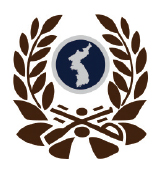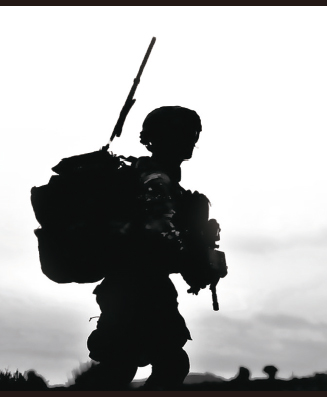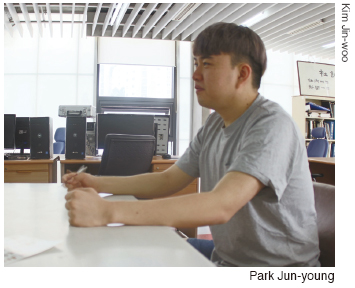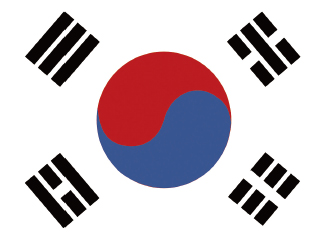
In South Korea, all male citizens are required to serve in the military. After their national service, the now civilians undergo an annual reserve forces training for six years. In order to concentrate on their academics, university students are obliged to attend a training for eight hours every year, and our fellow students of University Of Seoul are no exception. On a hot summer day, all the boys gather at school and leave as a team. Apart from long-debate topic whether such mandatory national service should be deemed sacred, it is hard to willingly join the training when the conditions are adverse. Nobody hardly cares, but almost every male student has to do it. Let us look at how the concerned UOS students in South Korea perceive such ironic situation that is the reserve forces training.

The UOS Times had an interview with a student of UOS, Park Jun-young (Dept. of Economics, ’15) to have a deep discussion about reservist training.
Q. Tell me the date of the training and what you think of it.
A. Friday, June 28. I had been there last year, too. It was even harder this time. I was dressed in battle clothes though it was midsummer. I trained hard and sweated so much in heavy rain. The training was not canceled, but instead, I put on a poncho and continued on training. The practice method has changed. In the past, you just had to do what you’re told to do. This time, however, you had to decide the order of your training and practice. It was tough because I was dressed and trained in field manual. Although the scores used to be unofficially recorded, the score system was formal this time. The trainees’ performance was ranked properly and practically. It would have been even more difficult if the reservist training took place for a longer period of time, such as two nights and three days.

Q. Do you prefer to take one day very seriously, or have two nights and three days leisurely?
A. One day is much better than two nights and three days for me. There are many other schools that go to the reservist training during the semester, and it troubles me to stay for three days because of the classes. Also, it is easier to catch up on the class if I finish the training in one day. The lodging would be too bad to stay for two nights and three days.
Q. What would you like to improve on the reservist training?
A. It’s too hot during the summer vacation. I can apply during the semester, but it’s too challenging to keep up with the class. Although I don’t think school can help, I think it would be better to do it at campus than a military camp. It would be a very short travel if that was the case. I think we could do all kinds of training except shooting. Another suggestion is to have the reservist training during the 14th week, the week of makeup lesson. The weather is fine, and I don’t need to attend classes, so I think it’ll be better than getting trained during vacation.
Q. What do you think about the extent to which you’re trained, although there’s no big difference between public service worker and exempt from duty? (public service workers have to get the training and exempts do not.)
A. The exempts, or women, should know the first aid. I think everyone should be given enough to be used in their daily life. That’s because the war hasn’t ended yet and also the training like the first aid actually can help our society.
Q. What should we do to improve the reservist training day for ex-soldier?
A. It would be a good solution to play related videos at school, too. the video would show the personality structure that should be fully empathized and respected. I think that will change the perception little by little. Reservist training is an activity that most men do, but nobody is interested. If the situation itself continues, it will likely be less efficient and less rewarding. I also hope the day will come when people experience pride during the training.

Polls on problems and suggestions for the current reservist training system conducted by The UOS Times shows coherence with the problems mentioned above. Many respondents reported the irrationality and discomfort they had to experience. The most common feedback was that there is almost no appropriate compensation in exchange for granting infringement on their personal liberties. Indeed, the only payoff for more than 2.5 million reservists acquire is daily monetary reward of 32,000 won for their training period, which is amount that has been doubled up, just in 2019. Criticism on the current compensation for the reservist is not new. According to the “Research on the Indemnification of Mobilization Reserve” conducted by the Ministry of Defense in 2010, the same problem was identified and several suggestions have been made with reference to the cases of other countries. A decade of time passed only proves lack of will and rigid execution of the administration of the Ministry of Defense (MoD) and how much more difficult and deeply rooted the problem is.
The second most common response in inquiry for the most problematic features of the current reservist system is none other than the “inefficiency of training program.” Reserve training program mainly consists of Special Qualification Training (SQT) and other military basics such as personal arms exercise and moral education. It is no exaggeration that these exercises are the sole reason and purpose of maintaining the reserve forces. Nevertheless, what has been under the scrutiny of many of trainees in fact is how those trainings were conducted. Most of the time is spent meaninglessly waiting for an individual’s turn, and a portion of the group does not get a chance to partake in the exercise when the program runs out of time. Moral education is notorious for its sleep-inducing effects. Without any kind of motivation or amends given to them, such mismanagement only hinders the very purpose of reservist training system.
One interesting response from the reservists is how much he was readily feeling the necessity of reservist training program. “Reservist training is absolutely necessary. The one and only problem is just how it’s done,” said the anonymous respondent. It is understood that after having completed their national service, the reservists possess the pride and desired understanding of how important it is to make their service count by attending the annual training. Despite all the irrationalities shown and reported on the current Korean military service, the respondents exhibited patriotism and willingness to make sacrifice. Reservists seem to perceive the function and system of the reservist training separately. “We just don’t want to experience again such impracticality we had to undergo during 2 years of our service,” the respondent added. In such light, the finger pointing at the MoD for failing to meet such devotion of its once-soldiers gets firmer.
The results of the interview and survey were analyzed in The UOS Times. Most of the answers to the questions were negative. For example, in many ways such as the appropriateness of training or the timing of training, students’ answers were mostly inconclusive and pessimistic. Nevertheless, many said that the reservist training itself is essential. Between those conflicting views, the general response to the current reservist training directs to in two different shadows of downside.
First is the efficiency of training. Based on the survey, students complained they do not wish to waste precious time to receive history education or nominal training that just consists of simple labor. They thought it was impractical to shoot already loaded guns and call an ambulance for five minutes on a scorching day. Specifically, learning what to do when it comes to wartime in detail or how to use a defibrillator (a machine that starts the heart beating normally again after a heart attack by giving it an electric shock) in a public place could be a better training.
Second is amends for training. As surveys and interviews show, students are discontent with skipping classes and participating in physical exercises on a sizzling summer day. The most common answer in the survey was “infringement on their personal liberties.” An insufficient reward was given to pay for the ride and lunch. Rather than these superficial efforts to make up for the training, administrative procedures should be suggested to supplement the classes. Also, students’ complaints could be much less than now if the administration at hand can compensate for the training day.
After conducting surveys and interviews, The UOS Times found that people were not thinking deeply about reservist training. Or they were discouraged to lack insights, trying to turn a blind eye to the irrationality and impracticality the current system holds. If reservist training is so steadily issued as a matter of human rights, it can be improved to remove small inconveniences, and allow all citizens who are obliged to serve in the military to change their perception of the day of reserve training.
Korea has exhibited marvelous economic growth called “The Miracle of Han River.” Nevertheless, such compact change in a short period of time required tremendous sacrifice and had to miss good amount of deliberation for civil minds to ripe and adjust to the modern society. The principle of private autonomy is the very backbone of any modern nation with the spirit of liberal democracy. Military service has been a hot topic of infringement of personal rights in Korea, probably ever since its foundation. Too many times our citizens have observed irrationalities in the military. Physical bullying in military was deemed common and natural for decades, but things started to turn around as public awareness sharpened.
The recent welfare given to soldiers in the national service, signified by a steep raise in their paycheck and a permission to use smartphones during their free time, is the outcome of such awakening. It is no different for the case of reservist training. No matter how rigid and inefficient the administration may seem, continuous awareness and persistent attention lodging opinions for betterment can cast seeds for change. Must Should the reservist training continue, it should be done in a manner in which its participants can feel pride, rather than bother and tire.
Kim Jin-woo
kjw1004i@uos.ac.kr
Kim Si-jin
michaelkimsijin@uos.ac.kr

